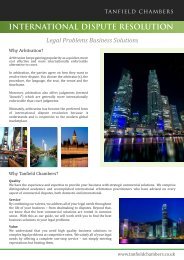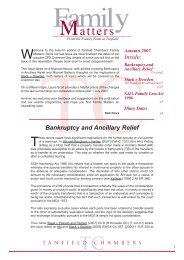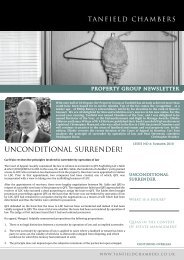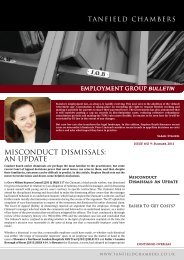Link to newsletter - Tanfield Chambers
Link to newsletter - Tanfield Chambers
Link to newsletter - Tanfield Chambers
You also want an ePaper? Increase the reach of your titles
YUMPU automatically turns print PDFs into web optimized ePapers that Google loves.
Martina Murphy<br />
Martina acts on behalf of NHS Trusts, the<br />
Metropolitan Police Authority, and local<br />
authorities, and is on Thompsons Solici<strong>to</strong>rs'<br />
approved panel of Counsel. Martina is also<br />
on the Employment Committee for the<br />
Federation of Small Businesses.<br />
Recently, in November 2009, she was instructed on behalf of a FTSE<br />
250 Company in its application for a High Court injunction which<br />
involved issues of restrictive covenants and protection of<br />
confidential information.<br />
When she's not working, Martina is a keen runner and has<br />
completed the London Marathon. She can often be found at a<br />
ridiculously early hour running around Greenwich Park with the<br />
Greenwich Runners.<br />
partnership, he would be regarded for that purpose as employed by the<br />
partnership.”<br />
The EAT dismissed the appeal, upholding the ET’s decision. In enacting<br />
s.4(4), Parliament had expressly provided that the legal test for<br />
determining whether a person was a partner or an employee of a<br />
partnership (the test under Partnership Act 1890) also determined<br />
whether a member of an LLP was employed by it for the purposes of the<br />
Employment Rights Act 1996. In the context of partnership, the tribunal<br />
had <strong>to</strong> decide first whether a person fell within the category of<br />
partnership or employment. If it decided that the person was not a<br />
partner, it did not follow that the person was necessarily an employee;<br />
the usual common law tests would still need <strong>to</strong> be applied, as the person<br />
might in fact be self-employed.<br />
The EAT decided that the tribunal had been correct <strong>to</strong> conclude that the<br />
words "any purpose" and "that purpose" in s.4(4) had <strong>to</strong> be regarded as<br />
a reference <strong>to</strong> K's role as chief investment officer, and that it had <strong>to</strong> ask<br />
itself whether, if the LLP was a normal partnership under the Partnership<br />
Act 1890, K's role as chief investment officer would be regarded as<br />
employment. The tribunal had been entitled, on the evidence before it, <strong>to</strong><br />
conclude that K was not an employee of TFO. It had applied the correct<br />
legal test and had made findings of fact, which it was entitled <strong>to</strong> make.<br />
The employee status of a controlling shareholder<br />
In Secretary of State for Business, Enterprise and Regula<strong>to</strong>ry<br />
Reform (BERR) v Neufeld & Anor [2009] IRLR 475 CA the Court of<br />
Appeal has given guidance on the approach employment tribunals<br />
should take in considering whether a majority shareholder should be<br />
regarded as an employee.<br />
The case concerned the common situation of a majority shareholder<br />
and/or direc<strong>to</strong>r of an insolvent company claiming <strong>to</strong> be an ‘employee’ in<br />
order <strong>to</strong> claim certain unpaid amounts from the Secretary of State under<br />
the Employment Rights Act 1996 s.182 Part XII (‘employee rights on<br />
insolvency of the employer’). On the facts of these joined cases, direc<strong>to</strong>rs<br />
with 90% (Neufeld) and 100% (Howe) shareholdings respectively in<br />
their companies were employees.<br />
Although the CA stated that whether or not such a shareholder/direc<strong>to</strong>r<br />
is an employee of the company is a question of fact, they gave some<br />
helpful guidance. In any such case there are likely <strong>to</strong> be two issues,<br />
although in practice the evidence relevant <strong>to</strong> their resolution will be<br />
likely <strong>to</strong> overlap.<br />
a. The first and logically preliminary issue will be whether the putative<br />
contract is a genuine contract or a sham.<br />
b. The second issue, assuming there is a genuine contract, is whether it<br />
amounted <strong>to</strong> a contract of employment (as opposed <strong>to</strong> eg a contract<br />
for services) at the relevant time.<br />
The CA made it clear, that, in particular, it will be no answer <strong>to</strong> a<br />
majority/controlling shareholder’s claim <strong>to</strong> be an employee <strong>to</strong> argue that<br />
he cannot be an employee in law because:<br />
(i) The extent of his control of the company means that the control<br />
condition of a contract of employment cannot be satisfied; or<br />
(ii) He has practical control over his own destiny and cannot be<br />
dismissed from his employment except with his consent.<br />
Further, the CA observed that an owner acting as an owner, as is<br />
inevitable in small companies for example, can also be an employee.<br />
TC<br />
Snow Problems<br />
Although what has been arguably the coldest snap in a<br />
generation has passed, its effects will be long felt. The popular<br />
press reported that millions were <strong>to</strong>ld that they would lose a<br />
day’s pay if they did not get in<strong>to</strong> work while Sky News announced<br />
that one in ten firms said that their entire workforce had been<br />
absent at times during the worst affected period. This article<br />
considers the issues which are likely <strong>to</strong> arise during episodes of<br />
extreme weather and suggests a guideline approach.<br />
Starting point<br />
our authors<br />
The starting point will always be the contract of employment or<br />
written particulars of employment. If there is a clearly defined policy<br />
<strong>to</strong> deal with inclement weather then that should be the end of the<br />
matter. This, however, will rarely be the case.<br />
Disciplinary sanction<br />
Theoretically, an employer might want <strong>to</strong> take disciplinary steps<br />
against an employee who has failed <strong>to</strong> turn up for work if, in their<br />
opinion, the employee was able <strong>to</strong> work but had chosen not <strong>to</strong>.<br />
As part of any disciplinary procedure an employer would be required<br />
<strong>to</strong> inquire in<strong>to</strong> the known circumstances of each absence. This would<br />
be essential given that consistency in treatment is one of the<br />
hallmarks of a fair disciplinary procedure. Given the extreme weather<br />
experienced almost universally this year it would be difficult for an<br />
employer <strong>to</strong> investigate the circumstances of each case and, therefore,<br />
<strong>to</strong> ensure a consistent approach.<br />
It would almost always be unfair <strong>to</strong> dismiss an employee for failing <strong>to</strong><br />
turn up <strong>to</strong> work where hampered by snow, particularly where the<br />
employer was aware that the employee would not be able <strong>to</strong> attend.<br />
Deductions from wages<br />
Anecdotal evidence suggests that some employers have proposed <strong>to</strong><br />
make, or have made, deductions from wages. By way of the ERA 1996,<br />
ss. 13(1) and 15(1) no deductions may be made from a worker’s<br />
wages unless:<br />
i. It is required or permitted by a statu<strong>to</strong>ry or contractual provision;<br />
or<br />
ii. The worker in question has given his/her prior consent <strong>to</strong> the<br />
deduction.<br />
continued on back page<br />
W W W. TA N F I E L D C H A M B E R S . C O . U K


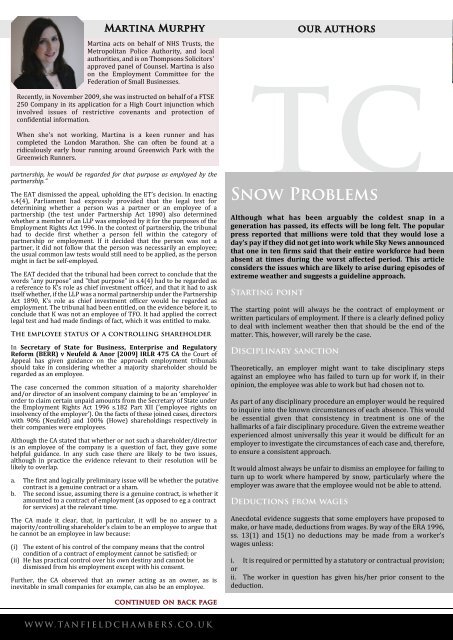
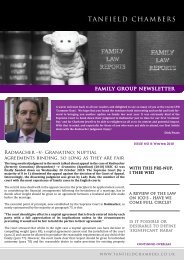


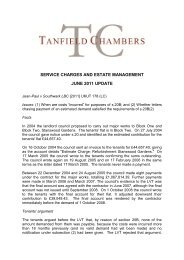
![Re Clarise Properties Ltd [2012] UKUT 4 (LC) - Tanfield Chambers](https://img.yumpu.com/36301708/1/190x245/re-clarise-properties-ltd-2012-ukut-4-lc-tanfield-chambers.jpg?quality=85)


